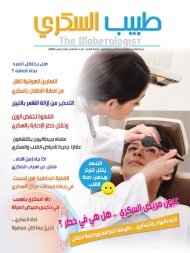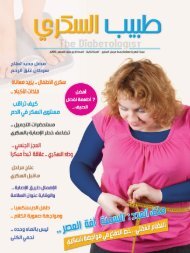The Diabetologist #5
طبيب السكري - العدد 5
طبيب السكري - العدد 5
Create successful ePaper yourself
Turn your PDF publications into a flip-book with our unique Google optimized e-Paper software.
Family history of: — Colorectal malignancy — Celiac<br />
disease — Inflammatory bowel disease<br />
Fever accompanying lower abdominal pain<br />
Relation to menstruation<br />
Relation to: — Drug therapy — Consumption of<br />
foods (especially milk), artificial sweeteners, dieting<br />
products, or alcohol — Visiting the (sub-)tropics<br />
Abnormal eating habits — Irregular or inadequate<br />
meals — Insufficient fluid intake<br />
Excessive fiber intake — Obsession with<br />
dietary hygiene<br />
• Family history of IBS. IBS clearly aggregates<br />
within families, although its genetics are poorly understood<br />
• Nature of onset (sudden onset in relation to exposure<br />
to gastroenteritis suggests PI-IBS)<br />
ity of abdominal symptoms<br />
Contribute to impairment in the quality of life and<br />
excessive use of health-care services<br />
For these reasons, coexisting psychological<br />
conditions are common in referral centers<br />
and may include:<br />
Anxiety<br />
Depression<br />
Somatization<br />
Hypochondriasis<br />
Symptom-related fears<br />
Psychological assessment<br />
Psychological factors have not been shown to<br />
cause or influence the onset of IBS. IBS is not a<br />
psychiatric or psychological disorder. However,<br />
psychological factors may:<br />
Play a role in the persistence and perceived sever-<br />
Dyspepsia—reported in 42–87% of IBS patients<br />
Nausea<br />
Heartburn<br />
Associated nongastrointestinal symptoms:<br />
Lethargy<br />
Backache and other muscle and joint pains<br />
Headache<br />
Urinary symptoms: — Nocturia — Frequency and urgency of<br />
micturition — Incomplete bladder emptying<br />
Dyspareunia, in women<br />
Insomnia<br />
Low tolerance to medication<br />
Additional tests or examinations<br />
In the majority of cases of IBS, no additional tests or examinations<br />
are required. An effort to keep investigations to a<br />
minimum is recommended in straightforward cases of IBS,<br />
and especially in younger individuals.<br />
Consider additional tests or examinations if warning signs<br />
“red flags” are present: — Onset of symptoms after 50 years<br />
of age — Short history of symptoms — Unintended weight<br />
loss — Nocturnal symptoms — Family history of colon cancer,<br />
celiac disease, inflammatory bowel disease — Anemia<br />
— Rectal bleeding — Recent antibiotic use — Abdominal/<br />
rectal masses — Raised inflammatory markers — Fever<br />
Although commonly performed, full blood counts, serum biochemistry,<br />
thyroid function tests, and stool testing for occult<br />
blood and ova and parasites are indicated only if supported<br />
by clinical history and where locally relevant.<br />
Additional tests or examinations may also be considered if:<br />
— <strong>The</strong> patient has persistent symptoms or is anxious despite<br />
treatment.<br />
— A major qualitative change in chronic symptoms has occurred.<br />
A new<br />
coexisting condition should be considered.<br />
Diagnosis of IBS to be continued , next edition.<br />
issue 5 < Oct. - Nov. 2011<br />
03


















